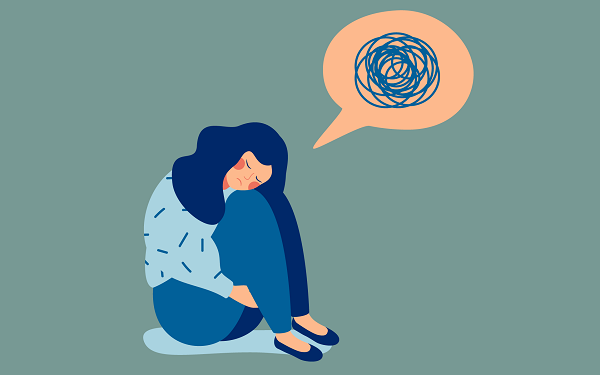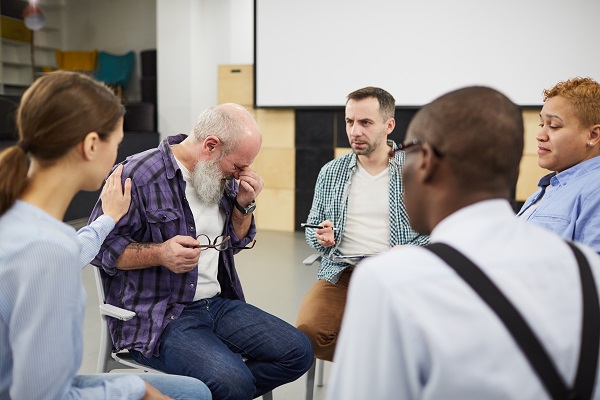Most of us have felt anxious before – anxiety is, after all, a red flag waved by our subconscious minds that we should be on the look-out for potential dangers. However, there is a huge difference between your garden variety anxiety about daily tasks and anxiety that begins to affect your physical and mental wellbeing with a sense of impending doom. Let’s unpack what anxiety is and how to deal with reducing anxiety, including warding off panic attacks.
Contents
- What Is Anxiety?
- Types of Anxiety
- What Are the Symptoms of Anxiety?
- What Causes Anxiety?
- Are Some People More Anxious Than Others?
- How Can You Deal With Anxiety?
- Identify the Source
- Fact Check Your Anxiety
- Manage Negative Thoughts
- Take Deep Breaths and Reduce Your Heart Rate
- Mindfulness Exercises
- Relaxation Techniques
- Find Peer Support or Professional Help
- Related
What Is Anxiety?

Anxiety is, by definition, a feeling of pervasive apprehension about a situation or event. Anxiety is more than just being “worried”. Many psychologists view anxiety as a fear of future events, specifically events that are out of your control. For people who experience anxiety, many cite the idea of not knowing what will happen next and thinking of worst-case scenarios as being two causal factors.
For many, anxiety is more than mere worry about real or perceived fears. There are a handful of anxiety and panic disorders that have millions of people seeking treatment each year. Aside from being its own category of mental illness, anxiety disorders are also comorbid with depression and other mental disorders, including bipolar disorder and PTSD.
Types of Anxiety

There are a few main types of anxiety. The first is generalized anxiety, which is persistent anxiety about common daily concerns; in other words, generalized anxiety is anxiety about many things in general. Generalized anxiety turns molehills into mountains. For example, while someone without anxiety might be concerned about paying a bill, someone with anxiety may jump to the conclusion that the inability to pay a bill will lead to homelessness.
Anxiety over particular fears, such as phobias, is another type of anxiety. There are several dozens of phobias, from arachnophobia to claustrophobia, that may make it difficult for a person to perform daily functions. For instance, someone with arachnophobia has such anxiety over spiders that they might be frozen or they may panic when presented with the source of their phobia.
The third type of anxiety is associated with panic attacks and is sometimes called a panic disorder; this is anxiety that is caused by specific triggers or traumas. People who are diagnosed with PTSD, CPTSD, and acute trauma suffer from this form of anxiety, which often has them relieving traumatic experiences, which triggers panic attacks and prevents them from effective daily functioning.
What Are the Symptoms of Anxiety?
While there are many types of anxiety, not everyone experiences anxiety in the same way or even to the same degree. Some people may have more extreme episodes of anxiety than others. There are many symptoms of anxiety, which you may experience independently or in combination. This may include mental and physical symptoms, such as:
-
- Faster or irregular heartbeat
- lightheaded and dizziness
- headaches and body aches
- chest pains
- loss of appetite
- tenseness or nervousness
- inability to relax or sleep
- worrying about the past or future
- feeling emotional or irritable
- difficulty concentrating
- inability to meet daily demands
- relationship difficulties
What Causes Anxiety?

Anxiety is caused by a myriad of factors, including daily stressors, life changes, health concerns, anticipated events, fear triggers, and much more. The cause of your anxiety might not be obvious to you. Many people do not realize they are feeling anxious until physical symptoms are present.
Are Some People More Anxious Than Others?
Yes. Some people are more prone to anxiety than others. A tendency to be anxious can be a matter of your personality, your circumstances, or other mental health issues you may have, such as comorbid conditions like depression. Some research suggests that anxiety may also be genetic to some degree, as those who have blood relatives with anxiety are at higher risk of being anxious themselves.
How Can You Deal With Anxiety?

Dealing with anxiety may involve some trial and error on your part, as what works to reduce anxiety in one person may not reduce anxiety in others. How you deal with anxiety may also depend on the type of anxiety you have – for example, what may work for those with social anxiety may not work for those with generalized anxiety. Some techniques for dealing with anxiety include:
Identify the Source
Knowing the source of your anxiety means being able to tell what it is that makes you anxious. Identifying the source is a good first step in learning how to manage your anxiety and your stress.
Fact Check Your Anxiety
Anxiety has a way of lying. Anxiety likes to paint worst-case scenarios that often jump to wild conclusions. If you can fact check your anxiety, you can help yourself avoid worst-case scenarios or even plan for their eventuality, even if those scenarios never happen.
Manage Negative Thoughts
Anxiety makes it very easy to dwell on negative thoughts. If you make an effort to focus on positive events or silver lining, you will be able to more easily manage negative thoughts and prevent yourself from ruminating.
Take Deep Breaths and Reduce Your Heart Rate

Anxiety sends our bodies into fight-or-flight mode, which means many of our central nervous processes are thrown off. Because anxiety may cause your heart to race or you might hyperventilate, one of the most helpful things you can do to manage physical symptoms is to take slow, deep breaths to calm your heart rate and return a clearer-thinking state of mind.
Mindfulness Exercises
Mindfulness exercises are all about staying grounded in the present, which will keep you from dwelling on future apprehensions. One good mindfulness exercise is to talk to yourself about the activity you are currently doing, such as walking yourself through making a cup of tea.
Relaxation Techniques
Relaxation techniques are any activity that helps relieve mental and physical stress. Some relaxation techniques include exercise, yoga, meditation, reading, or other self-care routines.
Find Peer Support or Professional Help

You may find that peer support from others in your community who also deal with anxiety may help. Seeking professional help from a psychologist or a psychiatrist may also allow you to deal with the source of your anxiety or find medication to help you manage anxiety attacks.
Anxiety is so much more than average worrying. When anxiety begins to interfere with your ability to perform your daily tasks, then it’s time to explore options of how to help yourself deal with anxiety. Whether you are taking a cognitive approach with mindfulness exercises or identifying the source of your anxiety, or you are focusing on physical symptoms of anxiety by pursuing relaxation techniques and deep breathing, you have many options for dealing with your anxiety. Follow Aging Healthy Today to learn more.


